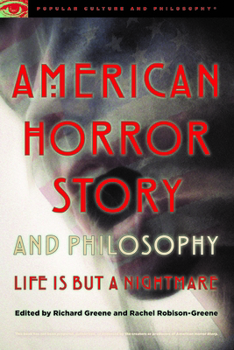American Horror Story and Philosophy: Life Is But a Nightmare
In American Horror Story and Philosophy , philosophers with varying backgrounds and interests explore different aspects of this popular "erotic thriller" TV show, with its enthusiastic cult following and strong critical approval. The result is a collection of intriguing and provocative thoughts on deeper questions prompted by the creepy side of the human imagination. As an "anthology show," American Horror Story has a unique structure in the horror genre because it explores distinct subgenres of horror in each season. As a result, each season raises its own set of philosophical issues. The show's first season, Murder House , is a traditional haunted house story. Philosophical topics expounded here include: the moral issues pertaining to featuring a mass murderer as one of the season's main protagonists; the problem of other minds--when I see an old hag, how can I know that you don't see a sexy maid? And whether it is rationally justified to fear the Piggy Man. Season Two, Asylum , takes place inside a mid-twentieth-century mental hospital. Among other classic horror subgenres, this season includes story lines featuring demonic possession and space aliens. Chapters inspired by this season include such topics as: the ethics of investigative reporting and whistleblowing; personal identity and demonic possession; philosophical problems arising from eugenics; and the ethics and efficacy of torture. Season Three, Coven , focuses on witchcraft in the contemporary world. Chapters motivated by this season include: sisterhood and feminism as starkly demonstrated in a coven; the metaphysics of traditional voodoo zombies (in contrast to the currently fashionable "infected" zombies); the uses of violent revenge; and the metaphysics of reanimation. Season Four, Freak Show , takes place in a circus. Philosophical writers look at life under the Big Top as an example of "life imitating art"; several puzzles about personal identity and identity politics (crystallized in the two-headed girl, the bearded lady, and the lobster boy); the ethical question of honor and virtue among thieves; as well as several topics in social and political philosophy. Season Five, Hotel , is, among other disturbing material, about vampires. Chapters inspired by this season include: the ethics of creating vampire progeny; LGBT-related philosophical issues; and existentialism as it applies to serial killers, Season Six, Roanoke , often considered the most creative of the seasons so far, partly because of its employment of the style of documentaries with dramatic re-enactments, and its mimicry of The Blair Witch Project and Paranormal Activity . Among the philosophical themes explored here are what happens to moral obligations under the Blood Moon; the proper role of truth in storytelling; and the defensibility of cultural imperialism.
Format:Paperback
Language:English
ISBN:0812699726
ISBN13:9780812699722
Release Date:December 2017
Publisher:Open Court
Length:256 Pages
Weight:0.05 lbs.
Dimensions:0.7" x 6.0" x 8.9"
Related Subjects
PhilosophyCustomer Reviews
0 rating





